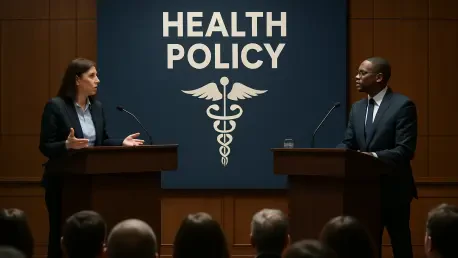Today, we’re thrilled to sit down with Dr. James Maitland, a renowned expert in public health policy and vaccine regulation. With decades of experience navigating the complex intersection of government, science, and societal health, Dr. Maitland offers a unique perspective on the evolving landscape of public health in the United States. Our conversation delves into the emergence of influential think tanks, the debates surrounding government involvement in disease prevention, the impact of specific ideologies on vaccine policies, and the broader implications for public trust in health systems. Join us as we explore these critical issues shaping the future of public health.
Can you shed some light on the origins of new think tanks in public health and what drives their creation during times of crisis like the COVID-19 pandemic?
Certainly. Many of these organizations, including those founded in recent years, often emerge from a deep frustration with prevailing policies or responses to major events. For instance, during the COVID-19 pandemic, widespread lockdowns and mandates sparked significant backlash from certain groups who felt these measures overstepped personal freedoms. This kind of reaction can fuel the creation of platforms that aim to challenge the status quo, advocating for alternative approaches to public health that prioritize individual choice over collective mandates. It’s a response to a perceived need for a counter-narrative, often rooted in libertarian or skeptical viewpoints about government overreach.
How do these newer organizations define their mission, especially in terms of supporting specific communities or ideas?
Many of these groups position themselves as defenders of those they believe have been sidelined or silenced during major policy shifts. They often aim to support professionals—think writers, scientists, or economists—who have faced professional repercussions for dissenting opinions. Their mission frequently centers on creating a space for debate and protecting against what they see as rigid, state-enforced consensus. It’s about fostering an environment where unconventional or controversial ideas can be tested without fear of censorship or exclusion.
What are some of the core beliefs these think tanks hold about the role of government in protecting public health?
A common thread among some of these organizations is a strong push to limit government intervention in health matters. They argue that centralized control over disease prevention—through mandates or widespread vaccination campaigns, for example—can infringe on personal autonomy. Instead, they advocate for more decentralized approaches, where individuals and communities have greater say in health decisions. This often puts them at odds with traditional public health frameworks that rely on government coordination to manage outbreaks or ensure population-wide immunity.
How have individuals associated with such organizations gained prominence in shaping U.S. health policy recently?
We’ve seen a notable rise of individuals tied to these alternative perspectives moving into influential roles within federal health agencies or advisory bodies. Some have secured senior positions at key institutions overseeing health policy, including roles that directly impact vaccine recommendations and regulatory decisions. This shift often comes through political appointments or alignments with administrations that share similar ideological leanings, allowing these individuals to bring their viewpoints directly into the policymaking process.
In what ways have these individuals influenced specific public health policies, particularly around vaccinations?
Their influence is particularly evident in the growing discourse around vaccine safety and necessity. Some have publicly questioned the effectiveness or risks of COVID-19 vaccines, despite extensive data supporting their benefits. Beyond that, there’s been a push to reevaluate routine childhood immunizations, with arguments that challenge decades of evidence on their role in preventing widespread disease. This has created a ripple effect, contributing to hesitancy among certain groups and complicating efforts to maintain high vaccination rates.
What concerns have been raised by critics about the impact of these ideologies on public health?
Critics are deeply worried about the potential erosion of trust in established health systems. Many experts in infectious diseases and public health argue that promoting skepticism about vaccines—especially without robust evidence—can undermine years of progress in controlling preventable diseases. There’s a fear that amplifying anti-vaccine sentiments, even if framed as open debate, can lead to lower immunization rates and increased outbreaks, putting vulnerable populations at risk. It’s seen as a dangerous precedent when such views gain traction at high levels of government.
How do you see the financial backing of these organizations playing a role in their influence?
Funding is always a critical piece of the puzzle. When organizations report millions in contributions over a short period, it raises questions about who is supporting their work and why. Substantial financial resources can amplify their reach—through publications, events, or legal challenges—allowing them to shape public discourse more effectively. While the specifics of donors often remain opaque, the scale of funding suggests a committed base that believes in their mission, which in turn can translate into broader political or social influence.
What is your forecast for the future of public health policy given these emerging influences?
Looking ahead, I think we’re in for a period of significant tension in public health policy. On one hand, the push for less government involvement and more individual choice could lead to innovative, community-driven solutions. On the other, it risks fragmenting our ability to respond cohesively to major health threats, like pandemics or resurgent childhood diseases. The balance between personal freedom and collective safety will likely remain a central battleground, and how we navigate this will depend heavily on whether evidence-based approaches can maintain public trust amidst growing skepticism. It’s a critical juncture, and the decisions made in the next few years could redefine how we approach public health for decades.









